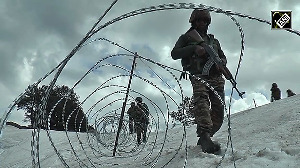The chief justice asked former ISI chief Asad Durrani if he admitted to distributing funds to the politicians. Durrani replied that he was the head of the intelligence agency at the time but had not involved others in the distribution of money.
Chaudhry then observed that intelligence agencies were involved in activities that are beyond their mandate. The chief justice read out a newspaper report which alleged that Rs 270 million was withdrawn from the
Intelligence Bureau's secret fund to change the government in Punjab province in 2009, and remarked that this was not part of the work of the intelligence agency.
Justice Khilji Arif Hussain, a member of the bench, referred to intelligence agencies and remarked that some people think they alone knew how Pakistan should be run.
The chief justice further remarked that national interests were very important and no compromise could be made on them but this did not mean that the agencies could exceed their mandate.
The bench asked Attorney General Anwar-ul-Haq to help the Pakistan Supreme Court to end the political role of intelligence agencies. The judges asked Haq to tell the court how the political role of intelligence agencies had been ended in other countries.
During the hearing, the attorney general told the bench that he had reviewed statements recorded in the past by former ISI chief Durrani, former army chief Gen Mirza Aslam Beg and late interior minister Naseerullah Babar regarding the distribution of funds among politicians in 1990 and found nothing that should be kept secret.
The bench also took up a request for forming a commission for recovering the funds distributed among the politicians and issued notices seeking the views of the respondents. The court subsequently adjourned the case till March 30.
The chief justice has repeatedly criticised the intelligence agencies while hearing several cases related to the detention of people without charge and the distribution of funds among politicians by the ISI. Such criticism of the powerful intelligence agencies by a state institution is rare in Pakistan.
The apex court recently forced the ISI and the military intelligence to produce seven men who were detained for over 18 months on charges of involvement in terrorism even after they had been acquitted by an anti-terrorism court.
The Supreme Court recently resumed hearing Asghar Khan's petition against the funding of politicians by the ISI after a gap of over 12 years.
Banker Yunus Habib has testified in court that he arranged Rs 1.48 billion for the military, and about Rs 400 million was distributed among politicians linked to the army-backed Islami Jamhoori Ittehad in a bid to prevent the Pakistan People's Party from coming to power in the 1990 general election.







 © 2025
© 2025